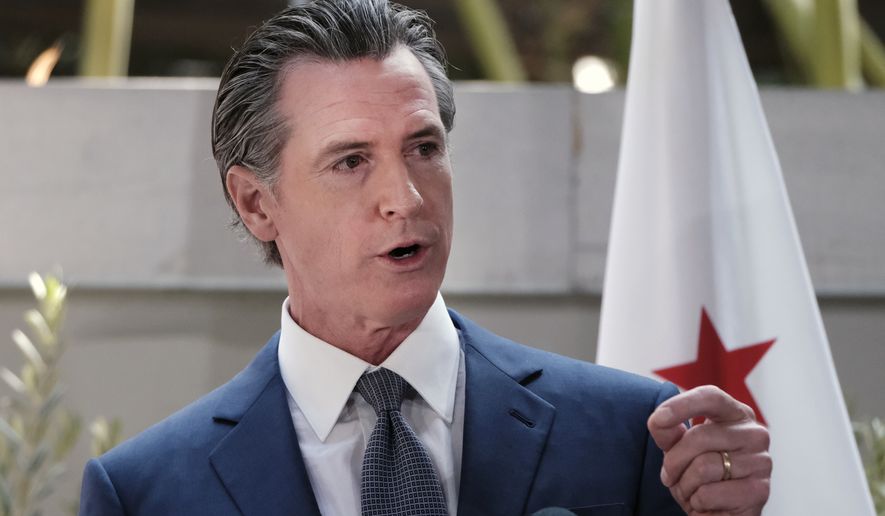Massachusetts leaders say they plan to dole out tax rebates of $250 to individual tax filers and $500 to married couples as part of a Democrats’ nationwide scramble to ease inflation pains.
The commonwealth is expected to have a budget surplus, so leaders decided to join the ranks of states finding ways to spread cash around to families struggling with everyday costs.
“Whether it is the rising price of gas, groceries, or summer clothes for kids, the Massachusetts legislature has heard loud and clear that increased costs due to inflation have cut into family budgets,” said House Speaker Ronald Mariano and Senate President Karen E. Spilka, both Democrats.
Eligibility for the tax rebates will be determined using 2021 income. Individuals must have earned a minimum of $38,000 while the maximum income for those eligible will be $100,000 for individual filers and $150,000 for joint filers.
California announced a similar tax rebate in a budget deal Gov. Gavin Newsom reached with lawmakers last month.
Individuals earning less than $75,000 per year will receive $350 as part of tax refunds in the $17 billion agreement while couples making less than $150,000 who file jointly are eligible for $700. Families in those categories with a dependent can qualify for another $350, meaning some families could see up to $1,050.
“California’s budget addresses the state’s most pressing needs, and prioritizes getting dollars back into the pockets of millions of Californians who are grappling with global inflation and rising prices of everything from gas to groceries,” said Mr. Newsom, Senate President Pro Tempore Toni G. Atkins and Assembly Speaker Anthony Rendon after striking the deal last month.
People across the nation are reeling from the high cost of gas and everyday goods, as supply chains shake off the pandemic doldrums and Russia’s invasion of Ukraine puts pressure on the global demand for fuel.
Critics say President Biden and Democratic allies fueled inflation with generous relief payments in early 2021, overheating the economy as supply struggled to keep up with demand. At the same time, state and national Democrats say the government has a role to play in alleviating the sting of high prices.
Many individuals and states have stockpiled stimulus money from Washington without spending it all. Economists warn that giving people more money and saying they can use it on things like gas may only exacerbate the problem by increasing demand without alleviating supply constraints.
“Giving them money is how we got into this trouble,” said Peter Morici, an economics professor at the University of Maryland who writes columns for The Washington Times. “If you just give people money and that was money that would have been spent on something else, it’s not terribly harmful. If you do it in a way that subsidizes gasoline, you really are just adding to price pressures on gasoline.”
Steve Hanke, a professor of applied economics at Johns Hopkins University, said temporary tax rebates are gimmicks and might not amount to much in the real world.
“Short-term fluctuations in peoples’ incomes don’t have significant impacts on their consumption,” he said. “If the tax cuts were permanent, the story would be quite different. Indeed, when peoples’ permanent disposable income increases, they boost their consumption.”
But state and national Democrats eyeing a difficult election cycle say the government has a role to play in alleviating the sting of high prices.
In Connecticut, families can apply by July 31 for a one-time child tax rebate of $250 per child, with a $750 maximum per household. State officials estimate that 350,000 families are eligible.
State Republicans say Gov. Ned Lamont and fellow Democrats are trying to boost their political fortunes in an election year while Mr. Lamont and allies contend families need the cash to deal with inflation and high gas prices.
New Mexico authorized tax rebates and economic relief rebates earlier this year. It is sending out the second round of payments this month.
Under the program, households of married couples or single individuals with one or more dependents can receive economic relief payments of $1,000, and households of single individuals without dependents can receive $500.
The Democrat-run legislature also set aside $20 million to give economic relief payments to nontax filers on a first-come, first-served basis.
“We’re delivering hundreds of millions of dollars in relief to New Mexico families,” Gov. Michelle Lujan Grisham, a Democrat, said after the program was launched in midspring. “As costs for gas, groceries and household expenses have risen across the country, we are taking immediate action to protect the paychecks of New Mexicans in every corner of our state.”
In Washington, Mr. Biden is pushing a social spending package that would extend supersized Obamacare subsidies and let Medicare negotiate down the cost of certain prescription drugs. He says any savings on health care services will alleviate the pressure on households’ pocketbooks.
He also proposed suspending the federal gas tax for 90 days to ease prices at the pump, though the GOP and Democratic leaders in Congress panned it as a gimmick.
• Tom Howell Jr. can be reached at thowell@washingtontimes.com.




Please read our comment policy before commenting.